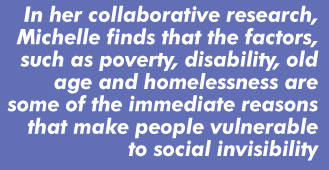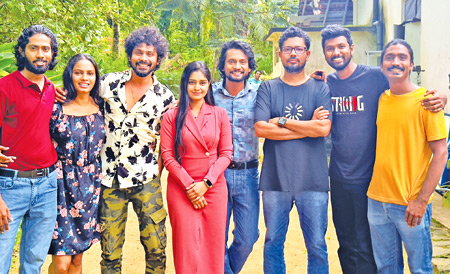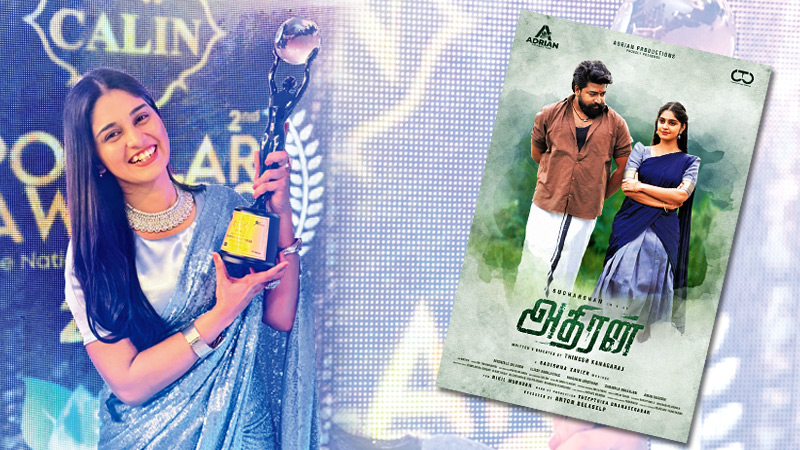 She cuts a dash, wherever she is spotted. She delights the eye with her state of rectitude and humbleness.
She cuts a dash, wherever she is spotted. She delights the eye with her state of rectitude and humbleness.
She is Michelle Dilhara, a sociological researcher, author, philanthropist, environmental activist, singer and actor. Ever since she set foot in the field of acting, she has been a recipient of numerous blue ribbon accolades, notably given to her by her ardent fans.
Meanwhile, the fact that Michelle being a researcher and author grabs a tremendous degree of ardour and zeal among her enthusiastic fanatics; winning the most popular youth teledrama actress of the year award is a real feather in her cap.
Receiving the Sri Lankan top 100 award is another milestone in her career as an artist and it has recognised her contribution for the betterment of the art field. The ceremony was recently held at the Waters Edge.
Michelle has done a bang-up job in writing “Social Invisibility is not Fiction, it Exits”. She made the book the bee’s knees. Following a four years research, conducted with the collaboration of Emeritus Prof. Antonette Perera, Dr Parakrama Warnasuriya and Dr Shiromi Fernando, Michelle gave birth to this distinctive book which predominantly takes the stage on the horrific and horrendous repercussions on social invisibility and the related reasons that give rise to the prevalence of the same.
Social invisibility is not a strange phenomenon that all of a sudden descended from the sky but a gruesome reality that has been around the block right throughout human history.
Social invisibility
“I too was once a victim of social invisibility. However, it took nerves of steel to overcome such feelings of isolation. Summoning my self-assurance and positiveness in order to combat the terrifying trauma that social invisibility may give you, I firmly told myself that I got to be the voice for the voiceless,” Michelle said.

Michelle Dilhara with her crew of Lalai Lilai Lai
Albeit the considerable research reports available on the aspect of social invisibility, a research gap still remains. As defined by the researchers, social invisibility is a term that is used to illustrate about some people in society who have been segregated or systematically disregarded by the majority culture.
In her collaborative research, Michelle finds that the factors, such as poverty, disability, old age and homelessness are some of the immediate reasons that make people vulnerable to social invisibility that may even go unheeded in some places.
Meanwhile, with the publication of “The Theory of Alternative Social Cogwheel”, Michelle paints a comprehensive picture on the strategies that could be applied in bringing down the negative consequences of social debarment and rejection. Michelle has striven to create effective and persuasive research.
While shedding light on the impact of social invisibility on the lives of the affected parties, the research has carved out a niche by examining the ways of combatting the issues behind the social invisibility and suggesting the avenues that could combat its reverberations.
Michelle’s research has pushed the envelope by exploring the potential of social ignorance and some people’s attitudes on highly sensitive areas of human life; the research has provided a theoretical framework to navigate on novel approaches which could facilitate the integration of the affected individuals into social networks.
In that light, Michelle along with Manusha D. Navarathna ushered in the Invisible to Visible Movement. They got the ball rolling by granting 500 English Language scholarships for the students who complain of facing language barriers. The program was contributed by Danushka Clark.
In an extension to the very same endeavour, opening “Senehas Arana”- a community centre, based in Divulapitiya that gives a much needed leg-up particularly for marginalised individuals who are in the twilight of life is one of her significant achievements.
“When you are over the hill, the feeling of being forsaken may give you such a sense of dejection; you get slumped in a deep air of despondency and depression and that’s exactly the time that you would feel like resisting being isolated and requesting to be surrounded by your loved ones and the other people in society. I am tickled pink for being able to be a part and parcel in this subtle endeavour of combating social invisibility”, Michelle said.
While being involved in her academic ventures and community development projects, Michelle finds time to take part in the programs of environmental and artistic significance, organised by the secondary and tertiary educational institutions; she recently graced two occasions as the chief guest of the Emotions 05 event, organised by the National School of Business Management (NSBM) at its premises and a ceremony, organised by the National Institute of Business Management (NIBM) in accordance with their traditional new year celebrations.
Another invitation, extended by the faculty of humanities and social sciences of the University of Sri Jayewardenepura for their psychology orientation day is a prominent event about which she has a photographic memory.
Guest speaker
“I may still recall the classical extravaganza that I felt as the chief guest at the annual cultural day event of St. John Paul II English medium school, Wennappuwa”, Michelle said.
Michelle with an eloquent flow of words was also a guest speaker at a recently concluded program, named “Be You”, organised by the Rotaract club of the university of Ruhuna.
Michelle holds the title of the Earth Day Network Ambassador to Sri Lanka; her extensive contribution towards environmental protection highlights her commitment to achieve a sustainable environment, which is one of the sustainable development goals, declared by the United Nations. Michelle’s dulcet voice in her debut song “Mini Meulen”- the theme song of “Sri Wickrama” is gaining ground.
“Sri Wickrama” is a movie directed by Mohan Niyaz. Lyricist Nilar N. Cassim’s beautifully crafted words with the breathtaking music composition of Dinesh Subasinghe.







